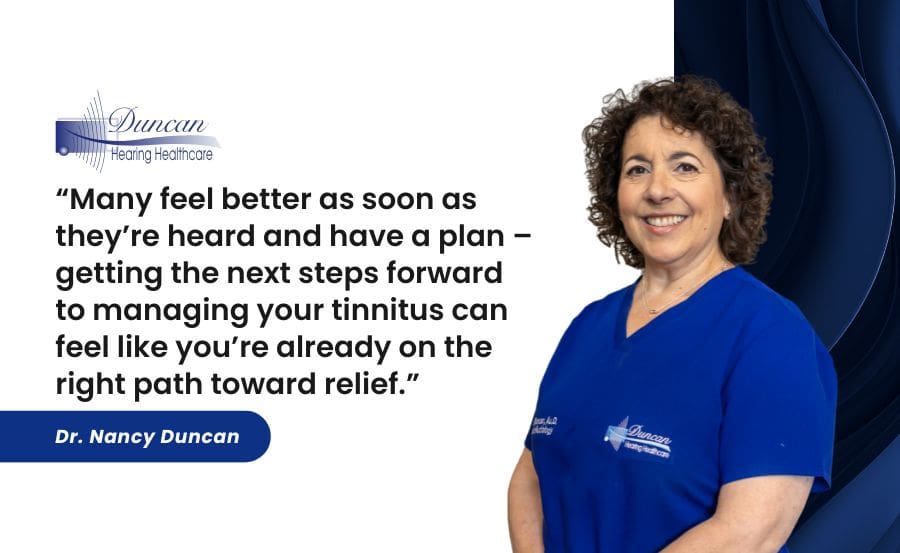Can you “un-hear” ringing once you notice it? While you may have been told that there’s “nothing to be done,” you deserve to know that effective, evidence-based management can help you regain control over your tinnitus.
I recently had the pleasure of going on 27 Degrees for an interview about tinnitus: what it is, what it isn’t, myths about the condition, and more. Check out the episode here to listen to me figure out whether it’s “tin-EYE-tus” or “tin-uh-tus,” as well as more fun among facts!
Tinnitus is often described as a ringing, buzzing, hissing, or even a “broken speaker” sound that only you can hear. Importantly, it isn’t an illness by itself; it’s a symptom most commonly linked to hearing loss or underlying auditory changes.
Although you may experience an array of sounds, including high-pitched tones, whooshes, or even a subtle hiss, what you’re really hearing is your brain’s response to the absence of external noise.
Think of tinnitus like a “phantom limb” sensation; when there’s reduced input from your ears, your brain sometimes fills in the gap with its own noise. There’s no cure, but there is a roadmap – and it works when we follow it.
At Duncan Hearing Healthcare, you benefit from a comprehensive, patient-first approach that starts with understanding what tinnitus is and how your unique experience plays a role in your treatment.
Why Your Tinnitus May Vary from Person to Person
You might have noticed that tinnitus can feel drastically different from one individual to the next. Some people report faint background noise, while others struggle with loud, distracting sounds that disrupt sleep and concentration.
The variations are due to multiple factors, such as differences in hearing loss, the specific frequencies affected, and even genetic predispositions. Because every person’s hearing is unique, the intensity, pitch, and distress it causes can vary widely.
Tailoring the management strategy to your particular situation is essential. A one-size-fits-all treatment is not effective. Instead, your treatment plan is built around your medical history, hearing status, and the specific nature of your tinnitus.
Many feel better as soon as they’re heard and have a plan – getting the next steps forward to managing your tinnitus can feel like you’re already on the right path toward relief.
Your First Step – A Comprehensive Hearing Evaluation
No effective management plan starts without a proper understanding of your hearing profile.
Your journey to lasting relief from tinnitus begins with a detailed tinnitus evaluation that includes questionnaires, audiologic testing, middle-ear checks, and even pitch and loudness matching exercises.
These procedures not only help to assess the extent of your hearing loss but also rule out any serious medical conditions, such as an acoustic neuroma.
We start with a hearing test – because we can’t manage what we haven’t measured. You benefit from a team that values a thorough hearing test as the cornerstone of your tinnitus management.
Careful evaluation ensures that any treatment plan is based on accurate data about your hearing and overall ear health.
Building Your Management Roadmap
There is no quick cure for tinnitus, but you can achieve real relief through a personalized management plan. Here are some strategies you might find beneficial:
- Prescription Hearing Aids: If your evaluation reveals hearing loss, hearing aids can help by shifting your focus to external sounds. They not only amplify the sounds, making it easier for you to hear speech, but also work to reduce internal “noise.”
- Sound Therapy and Sound Enrichment: You can use sound therapy during the day and especially overnight. Whether through devices or ambient sound sources, keeping the brain “busy” with a soft background hum prevents it from over-focusing on tinnitus.
- Behavioral Strategies and CBT: Cognitive behavioral therapy (CBT) techniques help break the cycle of stress and tinnitus. Coupled with proper sleep hygiene, these strategies are designed to reduce the impact of tinnitus on your daily life.
- Trigger Tracking: Tinnitus can be exacerbated by stress, caffeine, certain foods, and even changes in barometric pressure. Keeping a diary to track these triggers will empower you in managing your condition.
- Proper Ear Protection: It’s important to protect your ears in loud environments but avoid overusing earplugs in quiet settings. Over-silencing your ears might actually worsen the perception of tinnitus.
Separating Myths from Facts
You might have encountered claims about “miracle” supplements or generic sound devices that promise a quick solution.
It’s important to know that there is no “magic pill” for tinnitus. Instead, proven, evidence-based management combined with professional guidance is what leads to real relief.
Cheap, one-size-fits-all solutions not only fail to address specific frequencies you may be dealing with but can also instill false hope.
Why Silence Makes Tinnitus More Noticeable
Have you ever experienced tinnitus and then found that it worsens in a quiet environment or at night?
When there’s little external noise, even a subtle internal sound can stand out dramatically. By introducing gentle background noise with white noise machines overnight, you help your brain focus on external sounds rather than the tinnitus.
Silence is tinnitus’s best friend; sound enrichment shifts attention outward, meaning that strategies involving white noise machines, hearing aids equipped with sound therapy capabilities, or even simple household ambient noise can be a game changer in reducing the distress associated with tinnitus.
Empowering You to Take Control
Many patients find that meaningful improvement comes when they have a clear plan and feel heard by their care team.
You’re not alone in your journey – by being proactive, you set the stage for progress. Whether you’re struggling with tinnitus during the quiet hours of the night or feeling overwhelmed by its persistent presence throughout the day, know that relief comes from a structured, personalized approach.
Don’t suffer in silence any longer. You can rest assured that you will be guided through a comprehensive tinnitus evaluation and build a personalized roadmap for managing your symptoms.
Reach out today and book your comprehensive tinnitus evaluation. Together, you and our expert team can create a plan that turns down the noise and helps you reclaim control over your hearing health.





